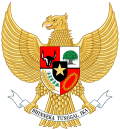Seventh Development Cabinet Kabinet Pembangunan VII | |
|---|---|
| 34th Cabinet of Indonesia | |
| 1998 | |
 | |
| Date formed | 16 March 1998 |
| Date dissolved | 21 May 1998 |
| People and organisations | |
| Head of government | Suharto |
| No. of ministers | 34 ministers |
| Member parties | |
| Status in legislature | Coalition |
| History | |
| Predecessor | Development VI Cabinet |
| Successor | Development Reform Cabinet |
| ||
|---|---|---|
Pre-presidency Domestic policy Foreign policy Post-presidency Family
| ||
| Gallery: Picture, Sound, Video | ||
The Seventh Development Cabinet (Indonesian : Kabinet Pembangunan VII) was the Indonesian cabinet which served under President Suharto and Vice President B. J. Habibie from 16 March 1998 to 21 May 1998. The term of this cabinet was supposed to end in March 2003, but due to student demonstrations and mass riots in 1998 due to the economic crisis that hit Indonesia, which led to Soeharto's resignation from his position on 21 May 1998 and the appointment of Vice President B. J. Habibie as the new president, this cabinet became a resigned cabinet. As its replacement, the Indonesian government was continued by the Development Reform Cabinet .
Contents
- The four cabinet aims
- President and vice president
- Coordinating ministers
- Departmental ministers
- State ministers
- Officials with ministerial rank
- Changes
- See also
- References
- Notes
The cabinet was formed in the midst of the Asian financial crisis and after Suharto was elected to a 7th term as president by the People's Consultative Assembly (MPR). It was a controversial cabinet where Suharto displayed his nepotism by appointing Siti Hardiyanti Rukmana as Minister of Social Affairs and gave Bob Hasan, a crony, the position of Minister of Industry and Trade. When things went out of control in May 1998, Suharto tried to reshuffle the cabinet, but the rejection of 14 ministers to be part of the reshuffled cabinet became one of the reasons why Suharto chose to resign from the presidency.



